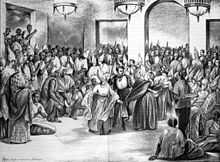Signare

Signare was the name for the Mestizo French-African women of the island of Gorée in French Senegal during the 18th and 19th centuries. These women of color held some power in a patriarchal system throughout the Atlantic Slave Trade.
Social and economic role
Signares commonly had power in networks of trade and wealth within the limitations of slavery. The influence held by these women led to changes in gender roles in the family structure archetype. Signares commonly had power in networks of trade and wealth within the limitations of slavery. Some owned masses of land as well as slaves. European merchants and traders would settle on coastal societies inhabited by signares in order to benefit from the increased proximity to the sources of African commerce. The earliest of these merchants were the Portuguese. These merchants were given the name "lançados", because "they threw themselves" among Africans, and they would establish relationships with the most influential signares who would accept them in order to obtain commercial privileges.[1] Many signares were wed under “common local law” that was recognized by priests of the Catholic faith.These marriages were for economic and social reasons. Both signares and their husbands gained from these partnerships. Europeans passed their names down to the offspring and with it their lineage.
When some of the signares became too powerful leaders like the Portuguese Crown sought ways to remove the women from their wealth. Different crimes that the Portuguese Crown sought to accuse the women of were crimes against the state or crimes against Christianity. An example of this appears with Bibiana Vuz de França. She was a prominent signare who over the years accumulated a lot of wealth and slaves. After realizing how powerful that she was, the Crown wanted to find a way dismantle her influence and power. “Accused of rebellion, trading with foreigners, and tax evasion, she was imprisoned with her younger brother and another co-conspirator and taken to Cape Verde Islands”.[2] She was able to receive a royal pardon and free her younger brother after leading a coup against the Crown’s representatives. Due to her power, the Crown sought to criminalize Bibiana Vuz de França. However, once they realized that she was too powerful and too influential, all charges against her were dropped and she was once more considered loyal to the crown. Bibiana Vuz de França’s confrontation with the Portuguese Crown represents the strength that the signares in this time period had, and also the Portuguese growing inability to control the people.
List of notable signares
• Victoria Albis • Hélène Aussenac • Anna Colas Pépin • Anne Pépin • Mary de Saint Jean • Crispina Peres
Sources
- George E. Brooks, Eurafricans in Western Africa: Commerce, Social Status, Gender, and Religious Observance from the Sixteenth to the Eighteenth Century (Ohio University Press, 2003).
References
- ↑ Hafkin, Nancy J., and Edna G. Bay. Women in Africa: Studies in Social and Economic Change. Stanford, CA: Stanford UP, 1976. Print.
- ↑ Havik, Philip J.. Women and trade in the Guinea Bissau region: the role of African and Luso-African women in trade networks from the early 16th to the mid 19th century.2012. Print.